

|
Monthly archives: December 2006
Rowland Office
2006-12-22 05:49
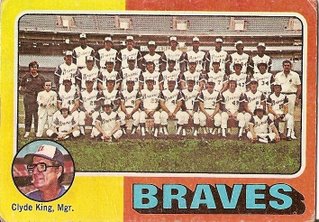 "When
I see a head from a great distance, it ceases to be a sphere and
becomes an extreme confusion falling down into the abyss." "When
I see a head from a great distance, it ceases to be a sphere and
becomes an extreme confusion falling down into the abyss."-- Alberto Giacometti The most surprising discovery I have made while sifting meticulously through my baseball card collection over the last few months is that I do not have a single Rowland Office card. I don't have a Rowland Office card from when Rowland Office was on the Braves, nor do I have a Rowland Office card from when Rowland Office was on the Expos. I would have bet a lot of money otherwise, since I have a distinct memory of gleefully charting the narrowing of Rowland Office's already narrow face on each new year's card. In fact, if I had to boil my baseball card collecting down to a single personage, I would probably pick Rowland Office who, because of his odd name and face and, most especially, because of the year-to-year serial drama that was his face-narrowing, was a source of constant fascination for my brother and me. After all, the login password I chose when I first started this blog (since changed) was "Rowland." I envisioned that somewhere along the line, as a centerpiece to the whole ridiculous endeavor of writing essays about decades-old rectangles of cardboard, I'd write a multi-installment Rowland Office epic, using a succession of his cards to show his strange narrowing and the narrowing but never completely disappearing and always increasingly strange sliver of my childhood, my childhood as it was when I lived through it, my childhood as it existed in the first years after its demise, my childhood as an abrasive fleck in the eye of my early adult years, my childhood as a box of old baseball cards haunting my first reluctant achy-kneed steps into middle age, narrower and narrower all the time, always changing but never gone, Rowland Office the slim indestructible muse of those slim indestructible years. So imagine my shock when I sorted every last card I own and found myself Rowland Officeless. I cannot explain it. Did I just imagine all the Rowland Offices of my youth? Did all of the Rowland Office cards always only belong to my brother? Did some of my cards get mixed in with my brother's cards in storage before my brother removed his cards to parley them into a used pair of Rossignols? Did someone break into our storage unit and remove all the Rowland Office cards from my collection, replacing them with seven 1975 cards of a Tiger player named Dick Sharon, like Indiana Jones switching out the golden idol in the booby-trapped cave with a bag of sand? Beats me. But here is the only card I own that features, at least in a minor way, Rowland Office. It's also one of the very few Braves cards I own. Perhaps the Rowland Office thief worked backwards through my collection, removing Rowland Offices carefully from my pack of Montreal Expos (where Rowland Office played in the latter years of my collecting), but then when the thief heard a car coming up the dirt road toward the storage barn he just grabbed as many Braves as possible to try to get the rest of the Rowland Offices before fleeing. So not only do I not have any Rowland Offices, I don't even have any Biff Pocorobas, which renders my long-held vision of expounding at great length about an imagined pitcher-batter matchup between Bob Apodaca and Biff Pocoroba null and void. But what can you do? A couple days ago I saw a message in plastic letters on the message board outside a church that read "Count your blessings, not your problems." The blessing here is that I do have a card with Rowland Office on it. (At the risk of counting a problem, not a blessing, the back of the card has a filled-in box next to Rowland Office's name, providing evidence that I was indeed at one time in possession of Rowland Office's 1975 card at least, god damn it.) I am pretty sure that Rowland Office is in the center of this picture, in the middle row with five guys to his right and five guys to his left. This was my first guess upon looking at the photo, and I eliminated the one other possibility, the man in the row behind him, by virtue of the visibility of that man's uniform number, 19, which was worn that year by Rod Gilbreath. There are a couple of other items of interest in this photo. In the upper row, second from the right, is Hank Aaron in his last Topps image as a Brave. Having been traded to Milwaukee just after the 1974 season, he is not included in the checklist on the back of this card and is featured elsewhere in a doctored photo as a Brewer. Opposite the second-from-right, top-row position in the photo of Hank Aaron's ghost is a small well-dressed man in the second-from-left, bottom-row position. This may be the smallest person associated with major league baseball since 3'7" all-time on-base-percentage leader Eddie Gaedel worked a walk in his only pinch-hit appearance for Bill Veeck's St. Louis Browns in 1951. Rowland Office, roughly centered between the giant ghost of Hank Aaron and this tiny mystery man, wears an expression that is impossible to read, a narrow Giacometti figure reduced to little more than a shadow but refusing to completely disappear. Johnny Bench
2006-12-21 06:17
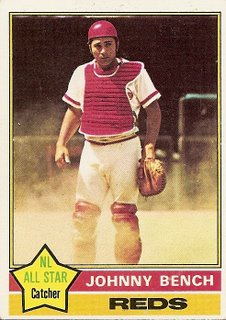 Johnny
Bench may be the best catcher who ever lived. If I was asked to
assemble an all-time team I might end up leaning toward Negro League
slugger Josh Gibson as my catcher, partly because of his first name and
partly because he was regarded as the best hitter in the history of the
Negro Leagues and is by many estimations among the top five power
hitters of any league, anywhere, ever. But I could make just as strong
an argument for Johnny Bench, whose defensive skills were superior to
those of Gibson or any other catcher before or since (with the possible
exception of Ivan Rodriguez), and whose offensive prowess enabled him
to be the hub of The Big Red Machine, perhaps the greatest offensive
lineup ever assembled. And not for nothing, but how cool is this
picture? With dust rising all around him, Bench is the gunslinger who
has just downed one challenger and who is now eyeing the next as if to
say, "You really think that's a good idea? Really?" Johnny
Bench may be the best catcher who ever lived. If I was asked to
assemble an all-time team I might end up leaning toward Negro League
slugger Josh Gibson as my catcher, partly because of his first name and
partly because he was regarded as the best hitter in the history of the
Negro Leagues and is by many estimations among the top five power
hitters of any league, anywhere, ever. But I could make just as strong
an argument for Johnny Bench, whose defensive skills were superior to
those of Gibson or any other catcher before or since (with the possible
exception of Ivan Rodriguez), and whose offensive prowess enabled him
to be the hub of The Big Red Machine, perhaps the greatest offensive
lineup ever assembled. And not for nothing, but how cool is this
picture? With dust rising all around him, Bench is the gunslinger who
has just downed one challenger and who is now eyeing the next as if to
say, "You really think that's a good idea? Really?"
Mike Parrott
2006-12-19 07:30
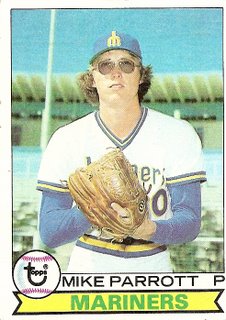 I
don't know how things stand now, but in the late 1970s the corrective
eyeware industry had not really mastered the operational aspects of
eyeglasses that, theoretically at least, got darker in the sunlight and
lighter indoors. There was this one kid in my grade, Craig, who had
tinted aviator glasses very similar to the ones partially masking Mike
Parrott's apprehensive expression, and Craig's glasses were never
tinted enough outside or untinted enough inside. I sort of hated Craig
because both he and I had curly hair and glasses and braces and played
small forward on our constantly defeated junior high basketball team. I
hated my curly hair and glasses and braces and losing and hated Craig
because I guess I needed in some way to put all that self-hatred onto
somebody else, especially a someone who didn't seem to mind all the
things that seemed like curses to me. In fact, I am pretty sure he
permed his fucking hair to make it curlier, and somehow the fact that
his glasses were tinted, that they featured this new,
attention-grabbing technology, made his glasses the same as the perm,
an embrace of his cursed status as a four-eyed brillo-head. By the time
we were in tenth grade and putting in our fourth straight season of
getting our brains beaten in on the basketball court, Craig's refusal
to realize that he was cursed had resulted in him even having a
girlfriend that he seemed likely to be having sex with, which was
something like the Apollo Space Program to my Caveman Banging Rocks
Together And Thinking About The Moon. But even so, in my mind Craig was
still the douchebag with the stupid tinted glasses. He had to be. I
don't know how things stand now, but in the late 1970s the corrective
eyeware industry had not really mastered the operational aspects of
eyeglasses that, theoretically at least, got darker in the sunlight and
lighter indoors. There was this one kid in my grade, Craig, who had
tinted aviator glasses very similar to the ones partially masking Mike
Parrott's apprehensive expression, and Craig's glasses were never
tinted enough outside or untinted enough inside. I sort of hated Craig
because both he and I had curly hair and glasses and braces and played
small forward on our constantly defeated junior high basketball team. I
hated my curly hair and glasses and braces and losing and hated Craig
because I guess I needed in some way to put all that self-hatred onto
somebody else, especially a someone who didn't seem to mind all the
things that seemed like curses to me. In fact, I am pretty sure he
permed his fucking hair to make it curlier, and somehow the fact that
his glasses were tinted, that they featured this new,
attention-grabbing technology, made his glasses the same as the perm,
an embrace of his cursed status as a four-eyed brillo-head. By the time
we were in tenth grade and putting in our fourth straight season of
getting our brains beaten in on the basketball court, Craig's refusal
to realize that he was cursed had resulted in him even having a
girlfriend that he seemed likely to be having sex with, which was
something like the Apollo Space Program to my Caveman Banging Rocks
Together And Thinking About The Moon. But even so, in my mind Craig was
still the douchebag with the stupid tinted glasses. He had to be.Anyway, Mike Parrott seems here to be on the brink of a humiliating discovery, his eyes fixed on the horizon as if an airplane skywriter is spelling out the last letters of a message that Mike Parrott's wife has run away with some other Mariner that Mike Parrott has always fervently believed to be a douchebag. In the season to come, Mike Parrott will valiantly battle the creeping self-doubt apparent in this picture, going 14-12 with a respectable 3.77 ERA. He will even begin the following year with a win, but then he will lose every single other game that year, 16 games in a row, to finish 1-16. I don't know if Mike Parrott's tinted glasses contributed to the monumental losing streak, but one has to wonder why a guy whose home games were in the roofed Kingdome would be drawn to glasses that were always a little too dark when the wearer of them was inside. Eddie Leon
2006-12-18 08:57
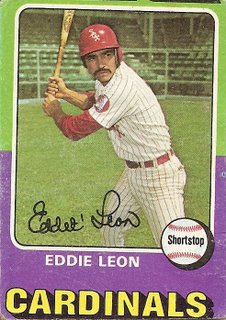 If
I'm going to have gods in my life--that is, if I'm going to try to draw
strength and a sense of wonder and mystery and the infinite beyond my
everyday existence in this concrete, finite, gonna-die world, the gods
are going to have to be capable of a wider embrace than the
constricting, suffocating girdle of perfection. I'm not praying to
perfection. I've tried that before in many different half-assed ways
and it doesn't work for me. I need hundreds of gods, not just one
perfect god glaring down on each of my mistake-filled days, turning
them into guilt-ridden cringes. I need gods that are fallible, even at
times forgettable, nothing and no one outside their embrace. If
I'm going to have gods in my life--that is, if I'm going to try to draw
strength and a sense of wonder and mystery and the infinite beyond my
everyday existence in this concrete, finite, gonna-die world, the gods
are going to have to be capable of a wider embrace than the
constricting, suffocating girdle of perfection. I'm not praying to
perfection. I've tried that before in many different half-assed ways
and it doesn't work for me. I need hundreds of gods, not just one
perfect god glaring down on each of my mistake-filled days, turning
them into guilt-ridden cringes. I need gods that are fallible, even at
times forgettable, nothing and no one outside their embrace.I need, among others, Eddie Leon, posing in a Chicago White Sox uniform while the crooked, cut-off, erroneous card he is posing on identifies him as a member of the St. Louis Cardinals and the back of the card declares he is neither a White Sox nor a Cardinal but a New York Yankee. The back of the card scripture also points out that this fallible (lifetime average: .236), forgettable (Eduardo Antonio Leon?) god "has been among Chisox' leaders in Sacrifices in '73 & '74." Among the leaders? On a single team? In bunts? I don't know how you could say any less about a guy without saying nothing at all. It suggests that when the White Sox really needed some bench guy of slight build and twitchy middle infielder reflexes to go up there and lay down a bunt, they looked first to somebody other than Eddie Leon, but if their top bunting specialist was for some reason otherwise occupied (perhaps he'd been entrusted with the more important task of going into the clubhouse to fetch a cold drink for one of the RBI guys such as Dick Allen or Beltin' Bill Melton), well, then it was Eddie Leon's time to go up there and intentionally make an out by tapping the ball as softly as possible. Or, to put it another way, using the capitalization style of the holy back-of-the-card texts, then it was time for Eddie Leon to Sacrifice. To Make Sacred. And if a fallible, forgettable guy like Eddie Leon in the wrong uniform on a defective card is capable of not only being sacred but making sacred, then who in our own damaged world is beyond the reach of hope? Derrel Thomas
2006-12-16 06:06
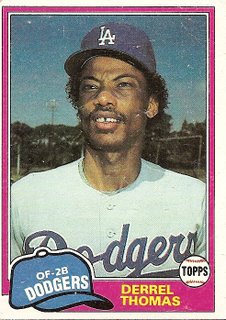 From
1975 through 1980, the years of my heaviest interest in baseball, i.e.,
my childhood, the San Diego Padres always finished just behind the San
Francisco Giants: From
1975 through 1980, the years of my heaviest interest in baseball, i.e.,
my childhood, the San Diego Padres always finished just behind the San
Francisco Giants:1975: The Giants finished third and the Padres fourth. 1976: The Giants finished fourth and the Padres fifth. 1977: The Giants finished fourth and the Padres fifth. 1978: The Giants surged back up to third, the Padres barnicled to their hull in fourth. 1979: The Giants fell back into fourth, shoving the Padres into fifth. 1980: The Giants plummeted to fifth, using the sixth-place Padres to cushion their fall. (Incidentally, the Padres did not break out of the pattern of having their view of the upper reaches of the N.L. West blocked by the Giants' ass until the arrival of Tony Gwynn.) I figure this season-in, season-out, caste-system clumping of the two mediocre teams is one reason why I have always associated them, others lesser reasons probably including the fact that they were both about as far away from me as possible and both began with the word "San." Because of this association, I have long had the belief that players were constantly shuttling back and forth between the two teams. This belief gained strength in the late 1980s, when, because of hallucinogenic drugs, literary pretensions, and certain painful events occuring in Shea Stadium in October of 1986, I was at a particularly pronounced remove from my former childhood religion of baseball, and so had trouble keeping track of whether Craig Lefferts was a Padre or a Giant. One minute he seemed to be on the Padres, the next the Giants, and the next back where he'd seemed to have been in the first place, my confusion based in part on the actual trade that brought him from one team to the other but also because I was mixing him up at various times with Scott Garrelts, Greg Harris, the other Greg Harris, or Greg Minton. Anyway, despite whatever the actually reality of the situation was, I have for many years dimly pictured a glum brown and yellow bus with orange stripes dedicated primarily to the constant plodding movement of players up and down the California coastline from one fairly desolate N.L. West situation to another slightly less desolate N.L. West situation, or vice versa. This conceit may have been given fuel by the unfolding story in my baseball card collecting days of Derrel Thomas, who was among my earliest cards as a Padre, then was a Giant for some years, then was a Padre again before briefly disappearing from view. In truth I had just failed to get his card in any of the packs I bought that disappeared year, but if I'd thought about the absence, which I probably didn't, I might have hypothesized that Derrel Thomas had opted to retire rather than take yet another ride on the brown and yellow and orange bus. Instead, he had found an even better way to free himself from being the square blip drifting back and forth across an otherwise blank screen in the Sisyphusian Padre-Giant game of Pong. I imagine that such a scenario of escape as his--to the sky blue Dodgers, perennial chisel-jawed contenders for the N.L. West crown--had been spoken of often but without much hope on the brown and yellow and orange bus, like Ratso Rizzo wheezing and coughing and dying as he impotently dreams aloud of someday making it to Florida. Well, Ratso Rizzo may have never made it to his land of milk and honey, but Derrel Thomas did. Here he is in one of the last cards of my collecting days, on the brink of being a 1981 strike-year (hence at least partially asterisked) champion. He seems alert, slightly apprehensive, and a bit haggard, as if he's spent most of the last decade sleeping lightly on long, seedy busrides with his duffel bag on his lap and a boxcutter gripped in his fist. This expression and the odd combination of positions listed on his card--"OF-2B"--suggests to me that part of the reason he was able to escape the brown and yellow and orange abyss was that he made absolutely sure the Dodgers knew he'd do whatever it took for them to give him a chance. If Derrel Thomas's escape from the Padres-Giants suggest an alternate, happy ending to Midnight Cowboy, the events that must have enabled that escape suggest the beginning of another film from Hollywood's golden age, a film I for some reason keep returning to whenever I meditate for long on the Padres and Giants of the 1970s . . . Personnel Officer: Wanna work uptown nights? South Bronx? Harlem? Travis Bickle: I'll work anytime, anywhere. Personnel Officer: Will you work Jewish holidays? Travis Bickle: Anytime, anywhere. In his first two seasons on the Dodgers, Derrel "Anytime Anywhere" Thomas proved he was a man of his word, logging hours at every position on the field except pitcher, including five games as a catcher. As Travis Bickle put it, "It's a long hustle, but it keeps me real busy." Ozzie Smith
2006-12-15 06:31
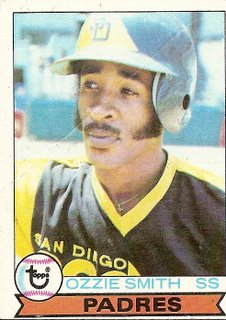 I'm
guessing that it wasn't long before Ozzie Smith became The Wizard. The
greatest fielding shortstop ever is featured here in his 1979 rookie
card (which I have taken my usual exemplary care of, judging from the
prominent crease running diagonally through his quizzical, slightly
mournful expression), and I'm thinking that even by the time this card
came out his Padre teammates were looking up to him. There was
undoubtedly something about him--related but not wholly confined to his
spectacular defensive play--that suggested his future greatness. I
imagine his Padre teammates gravitating to him for support, for here
was a man who, though only 5'10", was able to stand up tall in the
sinking quicksand of Padreness. I'm
guessing that it wasn't long before Ozzie Smith became The Wizard. The
greatest fielding shortstop ever is featured here in his 1979 rookie
card (which I have taken my usual exemplary care of, judging from the
prominent crease running diagonally through his quizzical, slightly
mournful expression), and I'm thinking that even by the time this card
came out his Padre teammates were looking up to him. There was
undoubtedly something about him--related but not wholly confined to his
spectacular defensive play--that suggested his future greatness. I
imagine his Padre teammates gravitating to him for support, for here
was a man who, though only 5'10", was able to stand up tall in the
sinking quicksand of Padreness.The below excerpt from Taxi Driver features a conversation between Travis Bickle, played by Robert DeNiro, and The Wizard, played by the great Peter Boyle, who, sadly, passed away a couple days ago. But it's fairly easy to imagine a somewhat similar conversation occurring between The Wizard of the Padres and any of a number of his struggling teammates, such as, oh, Derrel Thomas, whose utilityman career at the point of his chat with Ozzie had consisted entirely of being repeatedly shuttled back and forth, positionless, between the vague, ill-defined Giants and the vague, ill-defined Padres. Wizard: Things uh, things got ya down? Travis: Yeah. Wizard: Yeah, it happens to the best of us. Travis: Yeah, it's got me a real down, real...I just wanna go out and, and you know like really, really, really do somethin'. Wizard: The taxi life you mean? Travis: Yeah, well. Naw, I don't know. I just wanna go out. I really, you know, I really wanna, I got some bad ideas in my head, I just... Wizard: Look, look at it this way, you know uh, a man, a man takes a job, you know, and that job, I mean like that, and that it becomes what he is. You know like uh, you do a thing and that's what you are. Like I've been a, I've been a cabbie for seventeen years, ten years at night and I still don't own my own cab. You know why? 'Cause I don't want to. It must be what I, what I want. You know, to be on the night shift drivin' somebody else's cab. Understand? You, you, you become, you get a job, you you become the job. One guy lives in Brooklyn, one guy lives in Sutton Place, you get a lawyer, another guy's a doctor, another guy dies, another guy gets well, and you know, people are born. I envy you your youth. Go out and get laid. Get drunk, you know, do anything. 'Cause you got no choice anyway. I mean we're all fucked, more or less you know. Travis: Yeah, I don't know. That's about the dumbest thing I ever heard. Wizard: I'm not Bertrand Russell. Well what do ya want. I'm a cabbie you know. What do I know? I mean, I don't even know what the fuck you're talkin' about. Travis: Yeah I don't know. Maybe I don't know either. Wizard: Don't worry so much. Relax Killer, you're gonna be all right. I know. I seen a lot of people and uh, I know. Dave Winfield
2006-12-13 13:47
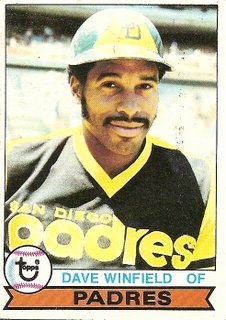 The
company I work as a proofreader for recently moved its headquarters
from one suburban highwayside location to another. The old location was
in what was termed a Corporate Campus, a collection of low brick
buildings with some paved walkways and a couple man-made ponds thrown
in. At the edge of this Corporate Campus was a McDonald's. I walked
there for lunch once every couple weeks, stepping around the droppings
from Corporate Campus geese. I bought a cheapskate lunch, the dollar
double-cheeseburger and dollar fries, no drink. Sometimes if I happened
to be feeling sort of hollow about the manner in which my life was
unfolding, however, I also sprung for a small chocolate shake. Because,
you know, I deserved it. The
company I work as a proofreader for recently moved its headquarters
from one suburban highwayside location to another. The old location was
in what was termed a Corporate Campus, a collection of low brick
buildings with some paved walkways and a couple man-made ponds thrown
in. At the edge of this Corporate Campus was a McDonald's. I walked
there for lunch once every couple weeks, stepping around the droppings
from Corporate Campus geese. I bought a cheapskate lunch, the dollar
double-cheeseburger and dollar fries, no drink. Sometimes if I happened
to be feeling sort of hollow about the manner in which my life was
unfolding, however, I also sprung for a small chocolate shake. Because,
you know, I deserved it.The new location of my company is in a gigantic building located in a snarl of crowded, high-speed roadways that are approximately as welcoming to pedestrian traffic as is the surface of Jupiter. In other words, there will be no more hollow-souled milkshake-longing strolls to McDonald's. There is a Starbucks within the square-mile building, however, so maybe I can cultivate a new affinity for that relative newcomer to the brand-name malignancy game. Let's say just to make myself feel better that I am rambling in large part now out of sheer anti-capitalist spite, as if my incoherent flimsy associative style could be a stinging reply to the worldwide trend toward branding and sameness and cancerous, capitalist, pointed endeavors. Let's say I want to be different. Let's say I want to no longer weep with nostalgia for the pure loneliness and longing of childhood when I see McDonaldland images of white bags of French fries growing from green stalks like ears of corn (see yesterday's digressions loosely centering on poor Willie McCovey). Just as my parents tried to walk away from that trend in the early 1970s, I am trying to walk away from it now, at least in this moment, by digressing ever further from any semblance of a point. When I was in my early 30s, nearly the age of my mother when she tried to lead us away from McDonaldland, I spent a year in a cabin in the woods in northern Vermont with no electricity and no running water. As I have mentioned previously, this year was not nearly as Thoreauvian as it might seem on first mention. I did love it there, most of the time, but often I felt a gnawing longing for a point. My year at the cabin had been an attempt, in part accidental or merely an extension of the aimlessness that preceded it, to refuse to go from point A to point B, to refuse to acknowledge that there was a point at all, and the moments that gnawed at me were those in which I found myself wishing for someplace to go. A destination. A point. Once in a while this undefined ache got so bad I had to leave the cabin. On one of these days I drove around aimlessly for quite a while, then finally stopped to buy a newspaper to read box scores. If I had acted immediately on the information that I found on the sports page--that a couple hours north of me, in Montreal, the Padres were going to play the Expos and, more importantly, that Padre great Tony Gwynn was one measly hit away from the majestic immortal plateau of 3,000--things might have turned out differently, but as I remember it I sat with the information for a while, unable to decide a course of action, unable despite the gnawing inside me to incorporate the idea of a point into my generally pointless mode of existence. But slowly the idea grew. "The days go on and on . . . they don't end," observed Travis Bickle. "All my life needed was a sense of someplace to go." Goddamnit, I thought, someplace to go. I had let several precious minutes slip away, but I decided that I still had time to drive up to Montreal to see . . . history. For once I was going to be at a historical game! Until that time, probably my biggest claim to being witness to a notable baseball event was that I'd been at a game in Fenway when the legendary Seaver racked up win number 308, which allowed him to pull into a tie on the all-time list with some old-timer named Mickey Welch. But nobody talks about that game--I mean, Seaver won three more games that year anyway. So this was my first real chance to for once be at one of those games that cannot be paved over, a game to be protected in the collective memory. A historical landmark. My sense of having someplace to go infused most of my solitary charge north on I-89 and across the border into Quebec with a feeling that resembled in many ways the jittery breathless excitement of falling in love. Insipid pop songs on the radio made me laugh out loud with happiness, the road seemed downright Kerouacian, and the sky kept getting bigger and bluer as I left the claustrophobic green mountains for the wide flat plains of Canada. Tony Gwynn was coming to town, 2,999 hits to his name! Above and beyond any numerical accomplishments, Tony Gwynn had already done the seemingly impossible. Willie McCovey had arrived too late in his career to do it. Ozzie Smith had left too soon to do it, as had Dave Winfield, pictured here in the nauseating late-'70s uniform of Ray Kroc's McDonaldland warriors. But Tony Gwynn had stuck around, year after year, the greatest hitter for batting average since San Diego native Ted Williams, and in doing so had turned what seemed like a lifetime sentence on the Padres into an inspirational tale of triumph for these ignoble times. He had brought dignity to the Padres. In other words, he had brought dignity to McDonaldland. In other words, he had brought dignity to this carcinogenic drive-thru monotony we all call home sweet home. But I got hung up in traffic on the outskirts of Montreal. As my progress slowed to a jerking crawl, I found the pregame show on the radio. When the game started with me still miles from the stadium I gripped tightly to the steering wheel and to the knowledge that even the greatest hitters, such as Tony Gwynn, only reach base via a hit roughly three times out of ten. I also recalled that the only other time I'd been intimately interested in a player's 3,000th hit was back in the Cardboard God era with my thoroughly fallible, popping-out-to-Nettles hero, Yaz, who, as soon as he reached 2,999, seemed to begin aging at the same alarming rate as beleaguered President Jimmy "Malaise" Carter while going hitless game after game after game. Gwynn was due up in the first inning, but I figured he'd likely make an out, or draw a walk, or get hit by a pitch, or reach on an error, and then it would be a couple more innings before he came to the plate again, by which time I'd be seated in the clattering echo chamber of Olympic Stadium with a big plastic cup of 5 % Molson in my hands. When the broadcaster described Gwynn lacing a clean first-inning single to centerfield, I turned off the radio, guided my car down the closest exit ramp, and pulled into a shopping center parking lot. I sat in silence in my car in the parking lot for a while. Eventually I steered out of the lot and found the onramp for the highway heading back south. The border guard didn't really understand why the duration of my stay in Canada had been so brief. I kept trying to explain, but after a while his eyes just kind of glazed over, and he waved me back into my country. Willie McCovey
2006-12-12 05:52
 Drinkin' man listens to the voice he hears Drinkin' man listens to the voice he hearsIn a crowded room full of covered up mirrors Lookin' into the lost forgotten years For dignity --Bob Dylan Oddly enough, while the departure of the great Willie McCovey from San Francisco ushered in the aura of vagueness that engulfed the Giants for years to come (at least as I perceived it from my distortingly distant perch), his arrival in San Diego did nothing to pull the Padres out of a similarly obscure miasma. A few years later, McCovey returned to the Giants, but it was too late. They remained to me as they had been in his absence, a kind of grayness in which, as Travis Bickle might describe it, "one day [is] indistinguishable from the next, a long continuous chain." Nonetheless, the Giants always seemed to retain some semblance of dignity in their trudge from nowhere to nowhere, something that could not really be said for the Padres. A lot of this has to do with the fact that the Padres were an expansion team, unlike the legend-rich Giants, and did not have a history to draw on beyond the futile muttonchopped one-man RBI barrages of slugger Nate Colbert. The rest of it has to do with the uniforms. Although I can't find confirmation of this anywhere, it's probably no accident that Willie McCovey is dressed here in colors that resemble those worn by McDonald's wage slaves of that era. The year McCovey came to the Padres, 1974, was the same year they were bought by Ray Kroc, who'd made hundreds of millions of dollars developing McDonald's from a small southern California restaurant chain into a shiny nationwide yellow and red clown-haunted malignancy. Strangely enough, 1974 was also the year my family moved from the McDonald's-heavy suburbs of New Jersey to rural Vermont, in large part to escape the encroaching paved-over sameness of strip-malling America. My mother and stepfather, high on the back-to-the-land visions in books such as Living on the Earth ("When we depend less on industrially produced consumer goods, we can live in quiet places. Our bodies become vigorous; we discover the serenity of living with the rhythms of the earth. We cease oppressing one another."), were, symbolically speaking, fleeing from the Golden Arches. Ironically, if either I or my brother had been asked in the following years to provide an example of our agonized belief that we had been moved against our will by soy-loving hippies away from actual America to the middle of an unreachable nowhere, I feel pretty certain that we would have whiningly replied that there wasn't even a McDonald's within 40 miles of our house. While drifting around the Internet with a vague hope that I could latch onto something that would lend coherence to this rambling tribute to Willie McCovey, I happened upon an article that includes links to and comments on McDonald's commercials through the ages. The first ad features Ronald McDonald leading children through a wonderland where hamburgers and white bags of French fries grow in special hamburger and French fry patches. I had seen the ad years before, many times, and had longed to be one of those children, free to harvest bags of French fries at will. Seeing the ad again, especially the moment when the French fry patch comes into the view and then the reach of the smiling, skipping, throroughly untroubled children, actually made me emotional. People say stuff like "stay true to the dreams of your youth," but the dreams of my youth were all about imagining weeping with joy at the discovery in my otherwise boring rustic surroundings of a thriving McDonald's French fry patch. In other words, yes, Willie McCovey. Yes, I want fries with that. Hold the dignity. John D'Acquisto
2006-12-11 07:46
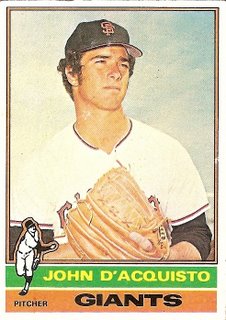 From
my remote vantage point as a daydreaming child collecting cards in
Central Vermont, the San Francisco Giants of the mid-to-late 1970s were
something more than a baseball team. They were also something less than
a baseball team, in that they never seemed even remotely involved in
the battle between the Reds and the Dodgers (and even, eventually, the
Astros) for the N.L. West title. This lack of prominence lent them an
air of mystery (if mystery can be sort of drab). They were like an old,
obscure, slow-paced black-and-white television drama that comes on
during a long rain delay between star-studded teams wrestling for a
division crown. Disappointed by the rainout and by the plodding, gray
replacement program, you switch around the dial for a while but then
come back because beneath the tedious dialogue and uninspired staging
and nondescript casting there is something weird going on that you
can't put your finger on, something that's probably going to seep under
your skin and cause you to end up staring at the ceiling at 3:00 in the
morning. From
my remote vantage point as a daydreaming child collecting cards in
Central Vermont, the San Francisco Giants of the mid-to-late 1970s were
something more than a baseball team. They were also something less than
a baseball team, in that they never seemed even remotely involved in
the battle between the Reds and the Dodgers (and even, eventually, the
Astros) for the N.L. West title. This lack of prominence lent them an
air of mystery (if mystery can be sort of drab). They were like an old,
obscure, slow-paced black-and-white television drama that comes on
during a long rain delay between star-studded teams wrestling for a
division crown. Disappointed by the rainout and by the plodding, gray
replacement program, you switch around the dial for a while but then
come back because beneath the tedious dialogue and uninspired staging
and nondescript casting there is something weird going on that you
can't put your finger on, something that's probably going to seep under
your skin and cause you to end up staring at the ceiling at 3:00 in the
morning.Metaphors aside, I never actually saw the Giants on television. Even in the all-star game their presence was so meager that their yearly lone representative was no more noticeable than the half-second blip in the corner of the screen made by a white-shirted extra fleeing ruin in a disaster film. They were not so much a team to me as a state of being, or somehow a lack of a state of being. More specifically, they seemed to be comprised of guys who were not quite whole. They were all somewhat insubstantial guys who were also other somewhat insubstantial guys. In the bullpen, lefthander Gary Lucas was also lefthander Gary Lavelle. In the outfield, Gary Maddox was also Gary Matthews, and then when Gary Maddox was traded to the Phillies, leaving the blurring haze of San Francisco to become a distinct personality, Gary Thomassen and Gary Alexander drifted in to fill, or rather to expand, the Garying San Francisco void. I confused Mike Ivie with Mike Lum (and also to a lesser extent Mike Vail), confused Steve Barr with Doug Bair, confused Dave Rader with Doug Rader, confused Mike Sadek with Ray Sadecki, and for reasons that I cannot explain thought of Von Joshua as the fourth Alou brother. In the coming years the fog of the mid-to-late '70s Giants would also come to encompass blurrings of identities across the years, Bob Knepper merging into Bob Kipper, Tim Foli merging into Tom Foley, Ed Halicki merging into Mike Bielecki who then merged into Bob Milacki. At the very center of the mystery was the man pictured here. I really can't make many unequivocal statements about the shape-shifting mist of my childhood, but I do at least know that John D'Acquisto was John Montefusco, at least until he was traded to the Cardinals for Butch Metzger, who I then began confusing with Roger Metzger. Fred Lynn
2006-12-08 06:48
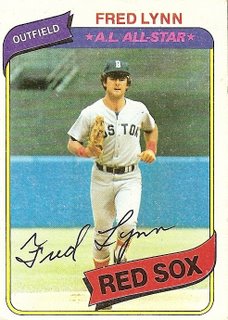 This
Fred Lynn card is from 1980, just after the second and final of his
great seasons. He was still a young man, just 28 years old, seemingly
about to hit the prime of his career. He had already won three Gold
Glove awards for his spectacular work in centerfield, had been the
first player ever to win the Rookie of the Year award and Most Valuable
Player award in the same season, and had in his most recent season come
as close to winning the Triple Crown as anyone had since his aging
teammate Yaz actually accomplished the legendary feat in 1967. This
Fred Lynn card is from 1980, just after the second and final of his
great seasons. He was still a young man, just 28 years old, seemingly
about to hit the prime of his career. He had already won three Gold
Glove awards for his spectacular work in centerfield, had been the
first player ever to win the Rookie of the Year award and Most Valuable
Player award in the same season, and had in his most recent season come
as close to winning the Triple Crown as anyone had since his aging
teammate Yaz actually accomplished the legendary feat in 1967.In 1980 he slipped back into the groove of pretty-goodness that had defined his seasons between the great seasons of 1975 and 1979. In 1981 he was traded to the California Angels and hit .219, perhaps trying to once and for all signal his fallibility to his adoring, overly needy fans who kept voting him onto all-star team after all-star team (even while he was hitting .219) and staring at him expectantly as if he was about to blossom for good into some incredible combination of Joe Dimaggio and Ted Williams. In 1982 he began the second stage of his career for real, posting seasons of remarkable sameness and pretty-goodness. His home run totals told the story of this stage of his career the best. He hit 21 homers that first year, 22 the next, then hit 23, 23, 23, and 23 homers the next four years before wrenching himself into hitting 25 homers in 1988. If he hadn't strained himself and had instead stuck with the usual 23 home runs, maybe he could have stuck around a little longer, but apparently the push for 25 took most of the fight out of Fred Lynn. In 1989 he only managed 11 home runs, and in 1990, long after everyone had finally stopped hoping for the golden Cooperstown version of Fred Lynn to return, Fred Lynn hit his last 6 dingers while clad in a brown and yellow San Diego Padres uniform. I have never seen an image of him in that uniform. I hope I never do. Herb Washington
2006-12-07 06:35
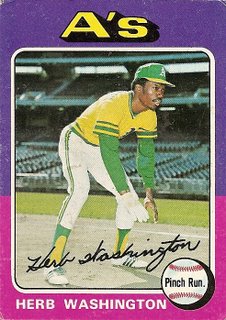 Herb
Washington was the only pure designated runner in the history of
baseball. Though the A's also used other players primarily as
pinch-runners during the mid-'70s, such as Matt Alexander and Don
Hopkins, Washington was the only specialist to never once bat or take
the field as a defender, and so was the only player ever to have "Pinch
Run." as his listed position on the front of a baseball card. Herb
Washington was the only pure designated runner in the history of
baseball. Though the A's also used other players primarily as
pinch-runners during the mid-'70s, such as Matt Alexander and Don
Hopkins, Washington was the only specialist to never once bat or take
the field as a defender, and so was the only player ever to have "Pinch
Run." as his listed position on the front of a baseball card.A's owner Charles O. Finley, a wealthy, blustering, delusional madman or visionary who in some ways epitomized and even defined the sublime and ridiculous era I have been trying for a long time to describe, envisioned Washington, a former college sprinter, as yet another advantage for the formidable Oakland squad. But instead of being a fortification of the already high-powered engine that carried the A's to league supremacy throughout the early- to mid-1970s, Washington ended up being the most superfluous (hence greatest) hood ornament on the biggest, baddest, Blue Moon Odomest Cadillac in the league. As recounted on the back of this card, Washington entered 91 games in 1974, his first season in the majors. He scored 29 runs, stole 28 bases, and was caught stealing 16 times. This is not a great stolen base to caught stealing ratio, and in fact would be identified by present day baseball numbers crunchers as counterproductive, Washington's jittery unpolished improvisations on the basepaths killing too many possible rallies to justify the occasional extra base. He only lasted until May of the following year, adding two more stolen bases and one more caught stealing to his all-time record. I did not scrutinize the stolen base to caught stealing ratio but was instead mesmerized by the fact that these statistics were included at all, for at that time and throughout the 1970s stolen bases were not included among the statistics on any other card. I also completely believed the overheated back-of-the-card space-filling prose created by a nameless Topps functionary, who wrote, among other things, that Washington was "personally responsible for winning 9 games for the A's in 1974." My guess is that in a couple of these 9 games, Washington merely trotted across the plate in front of a home run by one of the actual baseball players on the team, that in a few more of the 9 games he scored after a series of events not of his own doing that would have led just as easily to a score by the actual baseball player he replaced, and that the game or two where his speed actually seemed to provide the winning edge were more than cancelled out by his inexperienced baserunning gaffes in other games and by the fact that he took the place on the roster of someone who could, say, field a ground ball or dump a pinch-hit single into rightfield once in a while. But then again, his mere presence may have inflicted psychic damage on other teams. By carrying a guy on their roster who could not hit, pitch, or field, the A's were in essence declaring to their opponent that they could kick their ass with one hand tied behind their back. Wilbur Wood
2006-12-05 07:00
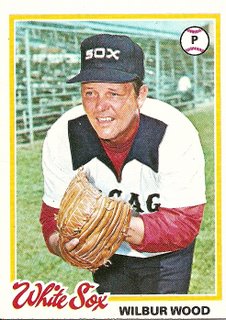 What
drew me into the world of the Cardboard Gods as much as anything else
was its clean, well-defined system of statistical landmarks. You knew
where you stood with the numbers on the back of a baseball player's
card. If a guy hit 30 home runs and drove in 100 runs, he was a star
slugger. If another guy turned in a sub-3.00 ERA, he was a top pitcher.
It was as simple as that, no gray areas, no confusion. This is part of
why people become religious, I think. They're looking for clear
guidelines on what's good and what isn't. What
drew me into the world of the Cardboard Gods as much as anything else
was its clean, well-defined system of statistical landmarks. You knew
where you stood with the numbers on the back of a baseball player's
card. If a guy hit 30 home runs and drove in 100 runs, he was a star
slugger. If another guy turned in a sub-3.00 ERA, he was a top pitcher.
It was as simple as that, no gray areas, no confusion. This is part of
why people become religious, I think. They're looking for clear
guidelines on what's good and what isn't.For starting pitchers, it's all about wins. If you win 20 games, you're an ace. Conversely, if you lose 20 games, you're kind of a rag arm, a luckless mushballer (though probably not utterly incompetent; after all, your team must have seen reason to keep running you out to the hill to take all those beatings). These seemingly mutually exclusive starting pitcher landmarks were well-known to me by the time I started inspecting the baffling statistics on the back of Wilbur Wood's card. In a five-year span, the aging knuckleballer with the 19th century name won 20 games four times, but he also lost 20 games twice, 19 games once, and 17 games once. The most confusing year of all was 1973, when Wilbur Wood achieved both plateaus in the same year, racking up 24 wins while also suffering 20 losses. I couldn't figure out right away if Wilbur Wood was bad or good, but eventually I came to see him as being in both name and deed some kind of a throwback to the rugged spike-gashing dawn of major league baseball, when hurlers started both ends of a doubleheader and then came on in relief despite massive corn liquor hangovers the next day at dusk to strand the go-ahead and winning runs in scoring position. Wilbur Wood was beyond Old School. He was Old Testament. He was the last vestige of a time when men named Rube and Mordecai and Smokey Joe and Grover strode as giants upon the land, their won-loss records both gleaming and gory, good and bad entangled. When Wilbur Wood hung it up, it left no one to stop the meek 5-inning starters and 4-pitch bullpen specialists from inheriting the earth. Mark Belanger
2006-12-04 13:02
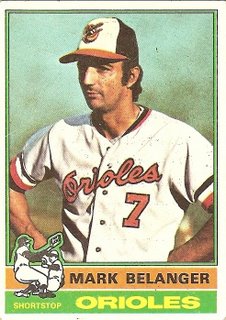 My life has three stages. My life has three stages.Stage One: the years when I was not yet aware of Mark Belanger Stage Two: the years when Mark Belanger was a constant if barely noticed presence in my life Stage Three: the Mark Belangerless years This card is from the second year of Stage Two, 1976, and it oozes comforting sameness from every pore. He is the same height and weight, 6'2" and 175 pounds, as he was the year before; he was born in Pittsfield, Massachusetts, and lives in Pittsfield, Massachusetts; he is an Oriole and has always been an Oriole, even before I was born; his batting averages for the three most recent seasons are .226, .225, and .226; and the highlight note underneath his statistics--"Mark hit a Homer in 1969 AL Playoffs"--is just a shorter version of the same highlight note at the bottom of his card for the previous year ("Mark hit a Homer in 1st A.L. Playoff game ever, for O's vs. Twins in 1969."). Stage Two seemed as if it would last forever. I guess I knew on some level I'd get older. I knew, even if I didn't fully believe it, that eventually I'd be too old to play little league baseball. I vaguely understood that there would come a day when my baseball cards would be a collection of artifacts gathered in the past rather than a living, breathing community that was growing in the present. I even had a hazy idea of adulthood (in my mind it meant living in a house and having everything figured out; I estimated that by age 30 I'd have the pain of life banished). I knew all these things, yet I also never really believed that it would end. How could there be a world without Mark Belanger? Very near the beginning of Stage Three, I took my first foreign language class, 9th grade French. The teacher was new to the school, and his name was Cormier. He was of French-Canadian descent but grew up in Western Massachusetts, where many French-Canadians had migrated in the days of yore to labor in textile mills. I don't know Mark Belanger's heritage, but his last name (was it once pronounced "Behlanjay"?) and his Western Massachusetts birthplace suggest that he and Cormier had similar backgrounds. The twosome also shared a slightly haunted, nervous demeanor. In Mark Belanger's case this seemed to be the price paid for such enduring competence and steadiness and sanity, the 9-time Gold Glove shortstop unblinkingly scanning the horizon for the bad hops of life, the high-strung chain-smoking sentinel of my childhood. On the other hand, Cormier's jittery mannerisms turned out to be the trebly upper register of a year-long symphony of chaos. We never learned any French. Cormier spent each day giving us detentions, allowing us to dare Randy Bradley to eat wads of paper, and telling us about his life. Most of his stories concerned his immediate past--he had until that year been an IRS agent and had just fled Washington, D.C., because he was convinced the angry recipient of an audit was trying to detonate his house with explosives--or his present-day battle with the state of Vermont to prevent the completion of a mental hospital under construction across the street from his new house. Cormier believed he was beset on all sides by wackos. He probably thought we were wackos, too, judging by the way he reacted whenever we turned our attention away from his monologues to talk amongst ourselves. He stopped rambling and fixed whoever was talking with a squinty malevolent stare. His finger would come up and point in the manner of an Invasion of the Body Snatchers pod person identifying someone who had yet to be replaced by an alien facsimile. "2:30," he'd say, naming the time he expected you to show up for your detention. Sometimes class was just a long series of 2:30s flung at us by Cormier. As far as I know, nobody ever paid any attention to any of it. I know I never showed up for one of his detentions. I'd never blatantly disobeyed that kind of order before from an authority figure, but the thought of being alone in a room with the guy in an otherwise emptied building was enough to push me into disobedience. The next year, there was no sign of Cormier. I was in a class with Cormier veterans when a new French teacher came into the room, strange language coming out of her. We just sat there looking at her blankly. She spoke her gibberish more and more slowly, becoming increasingly exasperated at the lack of response. Finally she gave up. "Isn't this French II?" she asked, in English. I wasn't among the few students who nodded. I wasn't really sure of anything anymore. Mike Easler
2006-12-01 07:28
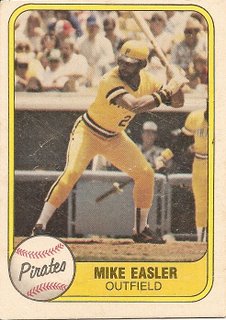 This
1981 Mike Easler card, the last gasp of my baseball card collection,
the enfeebled limping night janitor of the Cardboard Gods who flicked
off the lights of heaven's emptied hall, came in a package of cards
produced by a company other than Topps. In 1981, both Fleer and another
company, Donruss, won a long-fought legal battle to topple the monopoly
Topps had on producing the cards of major league baseball players.
While I applaud this in retrospect from an economic and political
standpoint, at the time I hated that such a foundational element of
what had been the most stable aspect of my life was changing. I guess I
was probably going to be through collecting cards in 1981 anyway, but I
do vaguely remember the feeling of disorientation that came with the
news that there were now three complete sets to collect cards from. It
was as if I had been going to the same church for years and all of the
sudden one morning I arrive to find three churches instead of one, each
one promising ease and comfort and rejuvenation and a place in the
afterlife, but imbedded in each of the promises was the threat that if
I chose wrong I'd be isolated and alone in a spiritually impotent
unsanctified shack disconnected from even the illusion of community. This
1981 Mike Easler card, the last gasp of my baseball card collection,
the enfeebled limping night janitor of the Cardboard Gods who flicked
off the lights of heaven's emptied hall, came in a package of cards
produced by a company other than Topps. In 1981, both Fleer and another
company, Donruss, won a long-fought legal battle to topple the monopoly
Topps had on producing the cards of major league baseball players.
While I applaud this in retrospect from an economic and political
standpoint, at the time I hated that such a foundational element of
what had been the most stable aspect of my life was changing. I guess I
was probably going to be through collecting cards in 1981 anyway, but I
do vaguely remember the feeling of disorientation that came with the
news that there were now three complete sets to collect cards from. It
was as if I had been going to the same church for years and all of the
sudden one morning I arrive to find three churches instead of one, each
one promising ease and comfort and rejuvenation and a place in the
afterlife, but imbedded in each of the promises was the threat that if
I chose wrong I'd be isolated and alone in a spiritually impotent
unsanctified shack disconnected from even the illusion of community.Besides the sheer fact that there was such a thing as Fleer cards, the thing I liked least about Fleer cards was that the backs of them were upside down. On Topps cards, the top of the back corresponded to the left side of the front. For six years, I had been looking at the photo on the front of Topps cards, and then flipping and turning the Topps cards so that the front left became the top of the back. Fleer decided they could improve on that system, matching the top of the back to the right side of the front. This may not sound like a big deal but consider this: it's now twenty-five years later and I'm still flipping over this Mike Easler card in such a way that his statistics are upside down. This has become merely annoying but it was downright anomic when I first tried to see who the hell this Mike Easler character was. And that's another thing. When I finally did get the statistics on the back of the card in a readable position, I discovered that Mike Easler had been in and out of the major leagues for as long as I'd been collecting cards, and he'd been in professional baseball almost as long as I'd been alive. I can see now that for all his major league seasons previous to 1980 he was a little-used late season call-up, but I'm sure at first glance the long-time presence in the majors of a guy I'd never heard of must have added to the existential dizziness of my initial moments with the card. At that time, the spring of 1981, I was in 8th grade and had learned that I was terrible at school, that I no longer had close friends, that my brother was going away to some boarding school the next year, that I sucked at basketball and baseball, and that the focus of my new all-encompassing interest, girls with breasts, was as hopelessly untouchable to me as a distant alien planet populated entirely by girls with breasts. And now Mike Easler and his stunning .338 batting average was here to inform me that I no longer even knew anything about baseball cards. |